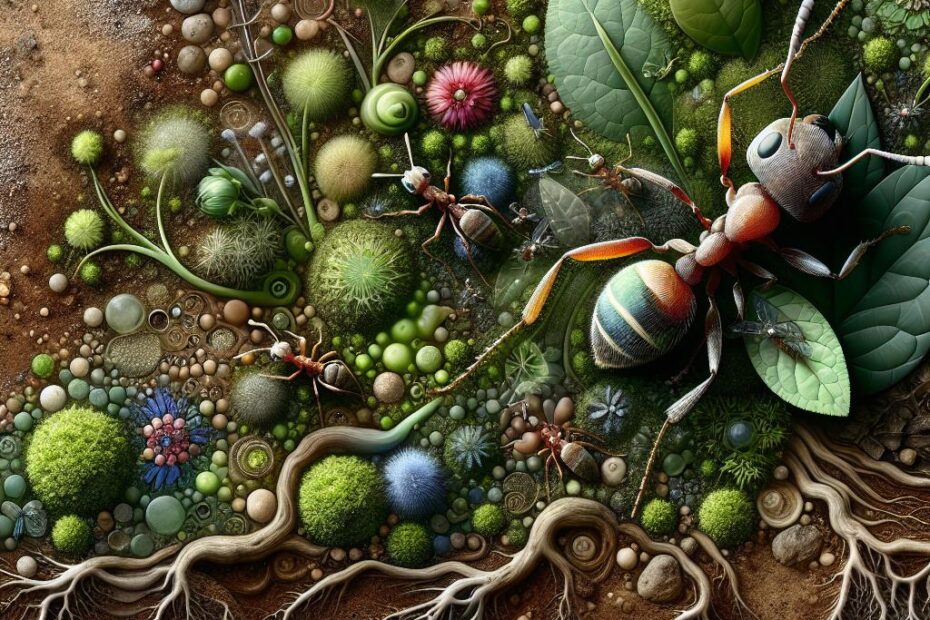Ants in Garden Soil: Causes, Effects, and Solutions
Introduction
Ants are a common sight in gardens, and while some species can be beneficial, others can cause havoc in your garden soil. If you’ve noticed ants crawling around in your garden beds, you may be wondering what impact they have on your plants and what you can do to manage them effectively.
In this article, we’ll explore the causes of ants in garden soil, their effects on plants, and provide practical solutions for controlling their populations. Whether you’re dealing with a minor ant problem or a full-blown infestation, this guide will help you navigate the world of ants in your garden.
What Causes Ants in Garden Soil?
Ants are attracted to gardens for a variety of reasons, including the availability of food, moisture, and shelter. Some common causes of ants in garden soil include:
-
Presence of honeydew-producing insects: Ants are known to “farm” honeydew-producing insects such as aphids, mealybugs, and scale insects. These pests excrete a sugary substance called honeydew, which ants feed on. If you have an infestation of honeydew-producing insects in your garden, ants are likely to follow.
-
Damp or waterlogged soil: Ants are attracted to moisture, so if your garden soil is consistently damp or waterlogged, it may provide an ideal habitat for ants to thrive.
-
Organic matter: Ants are scavengers and feed on a wide range of organic matter, including dead plant material, decaying wood, and compost. If your garden soil is rich in organic matter, it may attract ants looking for food sources.
Effects of Ants in Garden Soil
While some species of ants can be beneficial in gardens by aerating the soil and preying on harmful pests, others can have detrimental effects on your plants. Some potential effects of ants in garden soil include:
-
Aerating the soil: Certain species of ants tunnel through the soil, which can help to aerate it and improve drainage. This can benefit plant roots by allowing them to access oxygen and water more easily.
-
Plant damage: Some ants create tunnels near plant roots, which can disrupt the roots’ ability to absorb nutrients and water. This can result in stunted growth, wilting, and overall decline in plant health.
-
Protection of honeydew-producing insects: Ants that “farm” honeydew-producing insects can protect them from natural predators, allowing the pest population to grow unchecked and causing further damage to your plants.
Practical Tips for Managing Ants in Garden Soil
If you’re dealing with ants in your garden soil, there are several practical tips you can follow to manage their populations effectively:
-
Remove honeydew-producing insects: To discourage ants from entering your garden, eliminate their food source by removing honeydew-producing insects such as aphids and mealybugs. Use natural predators like ladybugs or lacewings to control these pests.
-
Improve drainage: To deter ants attracted to damp soil, ensure proper drainage in your garden beds by amending heavy clay soils with organic matter or installing raised beds.
-
Use ant baits: If you have a severe ant infestation, consider using ant baits to control their populations. Place bait stations near ant trails and follow the manufacturer’s instructions for best results.
-
Create physical barriers: To keep ants out of specific areas in your garden, use physical barriers such as diatomaceous earth, cinnamon, or coffee grounds. These substances are natural deterrents for ants and can help protect your plants.
Case Study: Managing Ants in a Vegetable Garden
John, a homeowner with a vegetable garden, noticed ants crawling around his garden beds and causing damage to his plants. After researching natural solutions for ant control, he decided to try the following methods:
- Planting mint and basil around his garden beds to repel ants naturally.
- Sprinkling diatomaceous earth around the base of his plants to create a barrier against ants.
- Using a homemade ant bait made from borax, sugar, and water to attract and eliminate ants.
After implementing these strategies, John saw a significant decrease in the ant population in his vegetable garden, and his plants were able to thrive without interference from ants.
Conclusion
Ants in garden soil can be both a nuisance and a potential threat to your plants. By understanding the causes of ants in your garden, recognizing their effects on plants, and implementing practical solutions for control, you can effectively manage ant populations and protect your garden from damage. Remember to observe good gardening practices, such as removing honeydew-producing insects, improving drainage, using ant baits, and creating physical barriers to keep ants at bay. With a proactive approach to ant management, you can enjoy a healthy and thriving garden all season long.
